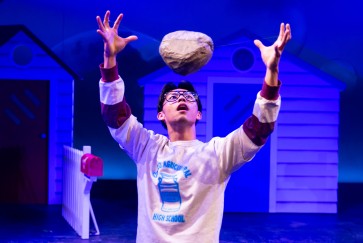The George Gershwin musical “Show Girl” debuted on Broadway in 1929. It was also the year the iconic song “Singin’ in the Rain” was first performed. That same year, the Women’s Athletic Association (W.A.A.) and the Men’s Union (MU) at Northwestern University joined forces to create one of the nation’s first coed college musicals. “Good Morning Glory” kicked off what would become a storied Northwestern tradition: the Waa-Mu Show — a show entirely written, produced and performed by students.
Ninety shows later, the tradition is still going strong even in the midst of a global pandemic. Since 1941, the Waa-Mu production has been staged in Cahn Auditorium. But this year, the 90th Waa-Mu Show, “The Secret of Camp Elliot,” is taking on a new temporary look. The musical will be an online streamed event. Some on the production team are calling it a “Waa-Movie.”
This show — simple in concept but monumental in undertaking — is still the gold standard for the college music theatre experience.”
School of Communication
“The Secret of Camp Elliot” is a supernatural mystery musical following three friends at summer camp in 1977. It was shot over the last few months in various outdoor locations in and around Evanston. The production will be available for streaming June 9-20. Tickets are now on sale. Admission is free to all Northwestern students with a valid NU email address and who complete the required registration form.
“‘The Secret of Camp Elliott’ is the perfect theatrical event for those who have ever been to summer camp or ever dreamt of going,” said Amanda Tanguay, director and choreographer of the online production. “Our audiences will experience the nostalgia of friendships, forged and broken, along with the feeling of days spent in team competitions and evenings spent questioning the cosmos under a canopy of stars.”
“The Waa-Mu Show tradition has stood fast amid more than 90 years of tragedies, triumphs, fashions, fads, globalization, a communication revolution and countless technological marvels,” said E. Patrick Johnson, dean of the School of Communication. “This show — simple in concept but monumental in undertaking — is still the gold standard for the college music theatre experience. Our students value its rigorous, rewarding collaborative opportunities and how it positions them to be successful in creative industries.”
Longtime musical supervisor joins Waa-Mu 'Wall of Fame'
The 90th Waa-Mu Show also marks a momentous year for longtime musical supervisor Ryan T. Nelson. In June, Nelson will join the Waa-Mu Wall of Fame. As an inductee, a plaque with Nelson’s image will be mounted alongside the previously inducted eight wall of fame honorees on the wall of the Cahn Auditorium lobby.
“The work of Waa-Mu takes many hands and collaborators to make the longest running collegiate musical in history happen,” said Wirtz Center for the Performing Arts Managing Director Al Heartley. “It is the consistent track record of students who leave the program and work in regional and commercial theaters where Ryan’s true legacy and impact is felt. His tireless mentorship of his students has been incredibly transformative for Waa-Mu, the Wirtz Center, and the arts as a whole at Northwestern.”
Nelson shared some thoughts with Northwestern Now about his 17-year tenure with the show and joining the Waa-Mu Wall of Fame.
What was your reaction to being added to the wall of fame with a lot of other Waa-Mu greats?
Shocked and honored. It is a wall of great people. I admire them all. Perhaps it feels a bit too early for me, but I was touched to be recognized. It will be awkward looking at myself on the wall for the next 20 years of rehearsal!
What was your role initially and how did it develop or change over the years?
In the early days, I did a majority of the music direction and had a student assistant every so often. Since it is a student-centered production, I felt it was important to give students more responsibilities in arranging, orchestrating and music directing. By 2009, we were running more like a Broadway music department, with a student (Ian Weinberger, who also happens to be the music director of “Hamilton” on Broadway) doing most of the music direction. My role became more of a mentor/supervisor. We now have about 50 students working on “Team Music” supporting the creation of the show. I am effectively managing a small army.
What do you like most about the Waa-Mu tradition?
I love that it has been such a long tradition. Ninety years — that is amazing in itself. Also, its legacy as the ultimate “passion project.” These students devote incredible amounts of time to something they believe in. It is fun to watch. The students change, but they are connected by the experience of creating something original. It is so collaborative! While we have many specific and fun traditions, what is most important is that Waa-Mu has the ability to adapt itself to the current moment. It reflects the interests and beliefs of our current students. That is the tradition.
What is your hope for the future of the Waa-Mu?
I believe that Waa-Mu is of profound importance in that brings together more than 100 students in an entrepreneurial, creative, co-curricular production lab that rivals any MFA or MBA program anywhere. I want Waa-Mu to live forever and change the lives of many more young artists who want to experiment in creating new musical theatre in a fun and historically important environment. We have a saying in Team Music: “Nobody knows.” It is very hard to communicate what it takes to take an idea, turn it into a song and scene, then compose and arrange it, rehearse and develop it, orchestrate it and finally perform and produce it. It takes a lot! I want everyone to know!

